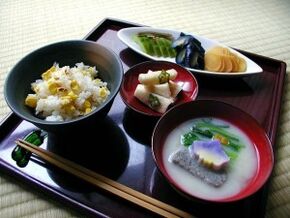The Japanese diet was created at one of the diet clinics in the country.
The makers of the system claim to completely reconfigure the metabolism of the human body, after which the extra pounds lost will not return for at least a few years.
Principles of the Japanese diet

A precondition for the use of the Japanese diet is a total rejection of all forms of alcohol, a ban on the use of salt and sugar, flour products and sweets.
A certain diet planned for two weeks must be strictly adhered to: the recommended menu must be followed continuously these days.
Diet makers believe that deviating from the diet can change your metabolism in an unnecessary direction. One of the conditions of the Japanese diet is to drink one and a half liters of plain water every day.
Here is an example for the first day according to the suggested Japanese diet menu:
- morning coffee;
- lunch - a couple of eggs with a tomato or 200 g of tomato juice, fresh cabbage salad;
- dinner - fish, 200 g and cabbage salad.
It is already clear from this example that the diet is not the usual Japanese cuisine at all. In Japan, carbohydrates are preferred, mainly in the form of cereals, and many seafood, vegetables and fruits are also consumed. Many doctors say this diet is what gives Japanese a longer lifespan.
In the Japanese diet, the 14-day menu pays very little attention to carbohydrates, which are the main source of energy, meaning the body is starting to consume available protein reserves in search of new ways to get food. muscle tissue.
As a result, it is not the adipose tissue but the muscle tissue that is lost. The situation does not change even the increased protein intake, which in addition overloads the kidneys.
Menu for all 14 days
First:
- Breakfast - coffee in a cup.
- Lunch - two eggs, cabbage salad with butter, tomato juice.
- Dinner - fish with olive oil.
Second:
- Breakfast - coffee and brown bread.
- Lunch - fish 200 g.
- Dinner - 100 g of boiled beef with a glass of yogurt.
The third:
- Breakfast - coffee with biscuits.
- Lunch - zucchini, fried in oil.
- Dinner - two hard boiled eggs, cabbage salad, 150 g of boiled beef.
Fourth:
- Morning coffee.
- Lunch - a hard egg, 3-4 pieces of boiled carrots, olive oil, a piece of hard cheese.
- Dinner - moderate amounts of fruit except bananas with grapes.

Fifth:
- Breakfast - grated carrots, lemon juice.
- Lunch - fish 200 grams, tomato juice.
- Dinner - fruits other than bananas with grapes.
Sixth:
- Morning coffee.
- Lunch - 200 grams of cooked chicken and cabbage salad in oil.
- Dinner - a pair of hard boiled eggs with raw carrot butter.
Seventh:
- Breakfast - green tea.
- Lunch - 200 g of beef, some fruit except bananas with grapes.
- Dinner - any dinner option this week except the third day.
Eighth:
- Morning coffee.
- Lunch - boiled chicken meat - 250 g, cabbage salad in oil.
- Dinner - two hard boiled eggs, carrot salad (200 g), olive oil.

Ninth:
- Breakfast - raw grated carrots, lemon juice.
- Lunch - fish, tomato juice.
- Dinner - various fruits (except bananas with grapes).
Tenth:
- Morning coffee.
- Lunch - boiled eggs and 3-4 boiled carrots, olive oil, hard cheese slices.
- Dinner - various fruits except bananas with grapes.
Eleventh:
- Breakfast - coffee with biscuits.
- Lunch - zucchini slices fried in oil.
- Dinner - two eggs, cabbage salad in butter, boiled beef 200 g.
Twelfth:
- Breakfast - coffee and biscuits.
- Lunch - 200 grams of fish, vegetable salad, cabbage with butter.
- Dinner - drink 100 grams of beef with a glass of kefir.
Thirteenth:
- Morning coffee.
- Lunch - two eggs, cabbage salad in oil, tomato juice.
- dinner - 200 g of fish,
Fourteenth, last day:
- Same menu as day 13.
Nutrition Expert Note
The recommended diet clearly lacks the leading trace elements - calcium, magnesium, potassium, which the body needs for full functioning.
There is also an iron deficiency, without which the hematopoietic organs cannot function. Vitamins A, B, and C are also deficient if they are not enough in the body, the appearance of a person deteriorates, the efficiency decreases, and the work of the endocrine glands and digestive organs is disrupted.
The low calorie content and monotony of a Japanese 14-day diet can lead to relapse and overeating. After the first week of such a diet, sleep disturbances and decreased performance are observed.
Black coffee in the Japanese diet is a controversial product. Japanese cuisine does not use coffee at all. People with cardiovascular disease should be wary of drinking coffee.






























